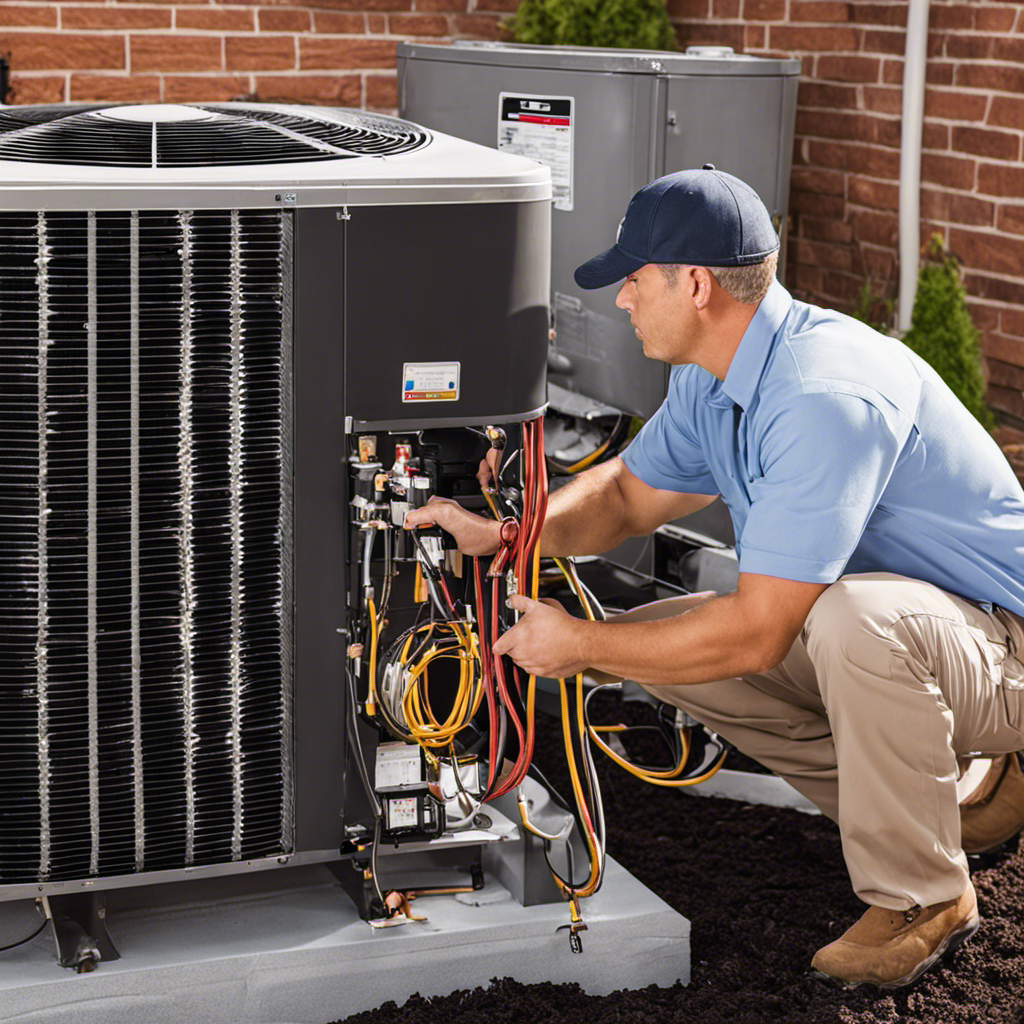As the temperatures begin to cool and the season transitions to fall, it is essential to ensure your HVAC system is ready to provide comfort and efficiency.
This article will guide you through the necessary steps to prepare your HVAC system for the upcoming season. By following these recommendations, you can maintain optimal performance, improve indoor air quality, and ultimately serve yourself and your loved ones by creating a comfortable and welcoming environment in your home or workplace.
Key Takeaways
- Thoroughly clean the HVAC system before fall
- Clean or replace air filters every 1 to 3 months
- Inspect and clean vents and ductwork for proper airflow
- Test and calibrate thermostat for proper functionality and accuracy
Clean and Inspect Your HVAC System
To ensure optimal performance, it is essential to thoroughly clean and inspect your HVAC system before the start of fall.
HVAC maintenance is crucial in order to avoid any potential breakdowns during the colder months. As part of your Fall HVAC checklist, cleaning the system is the first step.
Begin by removing any debris or dirt that may have accumulated around the outdoor unit. Next, clean or replace the air filters to ensure proper airflow and to prevent dust and allergens from circulating in your home.
Additionally, inspect the ductwork for any leaks or blockages that may hinder the system’s efficiency. Lastly, schedule a professional maintenance visit to have a thorough inspection of the entire HVAC system, including the electrical components and refrigerant levels.
Replace or Clean Air Filters
Clean air filters are essential for proper HVAC maintenance and ensuring that your system runs efficiently. It is recommended to clean or replace your air filters every 1 to 3 months, depending on various factors such as the type of filter, the level of pollutants in your home, and the frequency of system use.
Regularly cleaning or replacing your air filters not only improves the air quality in your home but also prevents dust and debris from clogging your HVAC system. By maintaining clean air filters, you can ensure that your HVAC system operates at its best during the fall season, providing comfort and clean air for you and your family.
Check and Clean Vents and Ductwork
Inspect and clean your vents and ductwork to ensure proper airflow and minimize dust and allergen buildup.
Regular vent maintenance and ductwork inspection are crucial for maintaining a healthy and efficient HVAC system. Over time, vents can become clogged with dust, dirt, and debris, hindering airflow and decreasing the system’s performance. This can result in higher energy consumption and reduced comfort in your home or office.
Test and Calibrate Thermostat
Ensure proper functionality and accuracy by testing and calibrating your thermostat before the start of the fall season. Your thermostat plays a crucial role in maintaining indoor comfort and energy efficiency.
By calibrating your thermostat, you can ensure that it accurately reads and maintains the desired temperature in your home. This will help prevent any unnecessary heating or cooling, leading to energy savings.
To calibrate your thermostat, start by checking the temperature reading against a reliable thermometer. If there is a significant difference, consult the thermostat manual for instructions on how to recalibrate it.
Additionally, consider using programmable thermostats that allow you to set different temperatures for various times of the day, maximizing energy savings.
Remove Debris From Outdoor Unit
To maintain optimal performance and efficiency, it is essential to clear away any debris that may have accumulated around and within the outdoor unit of your HVAC system.
As the fall season approaches, it is important to take the time to inspect and clean the outdoor unit to ensure it operates effectively throughout the colder months.
Start by clearing leaves, twigs, and other debris that may have gathered around the unit. These can obstruct airflow and hinder the system’s performance.
Additionally, it is crucial to check for any signs of pests, such as insects or small animals, that may have made a home within the unit.
Clearing debris and addressing potential pest issues will help your HVAC system function optimally, ensuring a comfortable indoor environment for your customers.
Schedule a Professional HVAC Maintenance Visit
To guarantee optimal performance and longevity of your HVAC system, it is imperative to schedule a thorough and comprehensive professional maintenance visit.
Regular HVAC maintenance benefits not only the system itself but also the homeowners in many ways. By having a professional technician inspect and service your HVAC system, you can ensure that it is running efficiently and effectively, saving you money on energy bills.
Additionally, maintenance visits can help identify potential issues before they become major problems, saving you from costly repairs down the line.
When it comes to finding a reliable HVAC technician, it is important to do your research. Look for technicians who are licensed, insured, and have a solid reputation in the industry.
You can also ask for recommendations from friends, family, or neighbors who have had positive experiences with HVAC technicians.
Frequently Asked Questions
How Often Should I Clean and Inspect My HVAC System?
The cleaning frequency and professional inspection of your HVAC system depend on various factors, such as usage, location, and manufacturer recommendations. Regular cleaning and inspection are crucial to ensure optimal performance and longevity of the system.
Can I Use Any Type of Air Filter for My HVAC System?
Different types of air filters for HVAC systems offer various pros and cons. Some filters, like fiberglass or pleated filters, provide basic filtration but may not capture smaller particles. High-efficiency filters, like HEPA or electrostatic filters, offer better air quality but may restrict airflow.
How Do I Check and Clean the Vents and Ductwork?
To ensure optimal performance of your HVAC system, it is important to regularly check for blockages and clean the air registers. This will help maintain proper airflow and improve indoor air quality.
How Do I Test and Calibrate My Thermostat?
To ensure optimal performance of your HVAC system, it is crucial to test and calibrate your thermostat regularly. By following thermostat calibration tips and troubleshooting any issues, you can maintain a comfortable indoor environment throughout the year.
Is It Necessary to Remove Debris From the Outdoor Unit Regularly?
Regular debris removal from the outdoor unit is necessary for proper maintenance. It helps improve airflow, prevent damage to the unit, and increase its efficiency. This maintenance practice is beneficial for the optimal functioning of your HVAC system.


